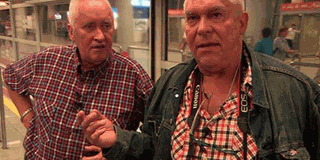Tiny, helpless... what happened to motherless babes?

A pair of twins, separated at birth at the end of World War Two, have been reunited after almost 70 years apart. George Skrzynecky and Lucian Poznanski, 69, were born in Germany after their Polish mother was sent to a forced labour camp. PHOTO | WWW.PORTALAZ.COM.BR
What you need to know:
- Last week, the item read as follows: “My name is Carolyn Jones. I was born on March 28, 1973 in London, England, at St Mary’s Hospital.
- I don’t know if there has been any response to Carolyn’s appeal but the facts as they stand raise all sorts of questions.
- Did Carolyn have a comfortable childhood with her adoptive parents in affluent America or would she have been happier with her real mother in London or the northern city of Newcastle?
My local paper runs a regular feature entitled Reunited, in which people seek lost friends, one-time army mates, bridesmaids at long-ago weddings, neighbours who moved away and so on.
Last week, the item read as follows: “My name is Carolyn Jones. I was born on March 28, 1973 in London, England, at St Mary’s Hospital.
I was born six months early and weighed only one pound and one ounce. The doctors told my birth mother my chances of survival were none. At that, she walked out of the hospital and never returned.
“Her address turned out to be non-existent, her name — Pat or Patricia Ross — was nowhere to be found and no-one in the area knew her. Her age was approximately 19 and her accent was from Newcastle upon Tyne. I was later adopted and moved to America.
“I want to find her, not only for family reasons or just to know her, but to let her know that she has an amazing 12-year-old grand-daughter and a very patient, loving son-in-law waiting to meet her. Someone, somewhere must know her.”
Signed CAROLYN JONES (email address).
I don’t know if there has been any response to Carolyn’s appeal but the facts as they stand raise all sorts of questions. Is it a sad story with a happy ending or a happy story with a sad beginning?
Did Carolyn have a comfortable childhood with her adoptive parents in affluent America or would she have been happier with her real mother in London or the northern city of Newcastle? Where/who was the father?
HUMAN CONUNDRUM
A few nights after reading of this human conundrum I watched a TV documentary about Jewish refugee children who fled Nazi Germany in organised transports just before World War II. The film reconstructed the fate of one small group of frightened boys and girls bound for England.
As their train slowly pulled out of the German station, a door was pulled open and a hamper was slid onto the carriage floor. The door banged shut again and the train departed.
The old lady telling this story on the film said: “All the children were looking at me and I realised I was the oldest, aged 13. I went to the hamper and lifted the lid. Inside were two tiny babies.”
For the rest of the long journey, the children cared for the babies, using their handkerchiefs as diapers, keeping them warm, sharing their milk. Eventually, the transport arrived in England and the children were farmed out among Jewish families and others ready to give them homes.
This story, too, raises a series of painful questions: Who put the two babies on the train? What sort of agony must their parents have gone through by giving up their tiny tots to the mercies of fate?
Did they regret it? Were children and parents ever reunited? Indeed, did the mums and dads survive the Nazi horror?
The story has an amazing ending. The elderly lady told the film-makers: “Recently I got an invitation. It was for the bar-mitvah (a Jewish coming-of-age ritual) for the grandson of one of those babies.”
***
Cecil Rhodes was a trader, mining magnate and one-time prime minister of the Cape Colony, who gave his name to Rhodesia — now Zambia and Zimbabwe.
When he died in 1902, he left millions to the University of Oxford to fund 89 scholarships per year for international students, and these have been won by such as ex-President Bill Clinton and actor and musician Kris Kristofferson.
Gratefully, the university placed Rhodes’s statue on the front face of Oriel College.
RACIST EXPLOITER
Nowadays, however, Rhodes is widely condemned as a racist exploiter of Africa’s resources and many students want the statue pulled down.
A South African campaigner, Ntokozo Qwabe, 24, said: “I feel as I would if I saw a statue of Hitler in Germany.”
However, Qwabe is himself on a Rhodes Scholarship and social media critics have denounced him as a hypocrite. If he feels so strongly, they say, he should give the money back. Qwabe retorts that the money never belonged to Rhodes, that he stole it from his (Qwabe’s) ancestors.
Oxford University’s Chancellor, Lord Patten, has declared that Rhodes was simply a man of his time and the statue will stay. The battle continues.
***
A man and a woman were having a quiet, romantic dinner in a fine restaurant, gazing lovingly at each other and holding hands.
Suddenly, the woman slid slowly off her chair, under the table and out of sight behind the table cloth, while her companion stared straight ahead.
Worried that this strange behaviour might offend other diners, the waiter went over and said, “Pardon me, sir, but I think your wife just disappeared under the table.”
The man looked up calmly and said: “No, she didn’t. My wife just walked through the door.”





